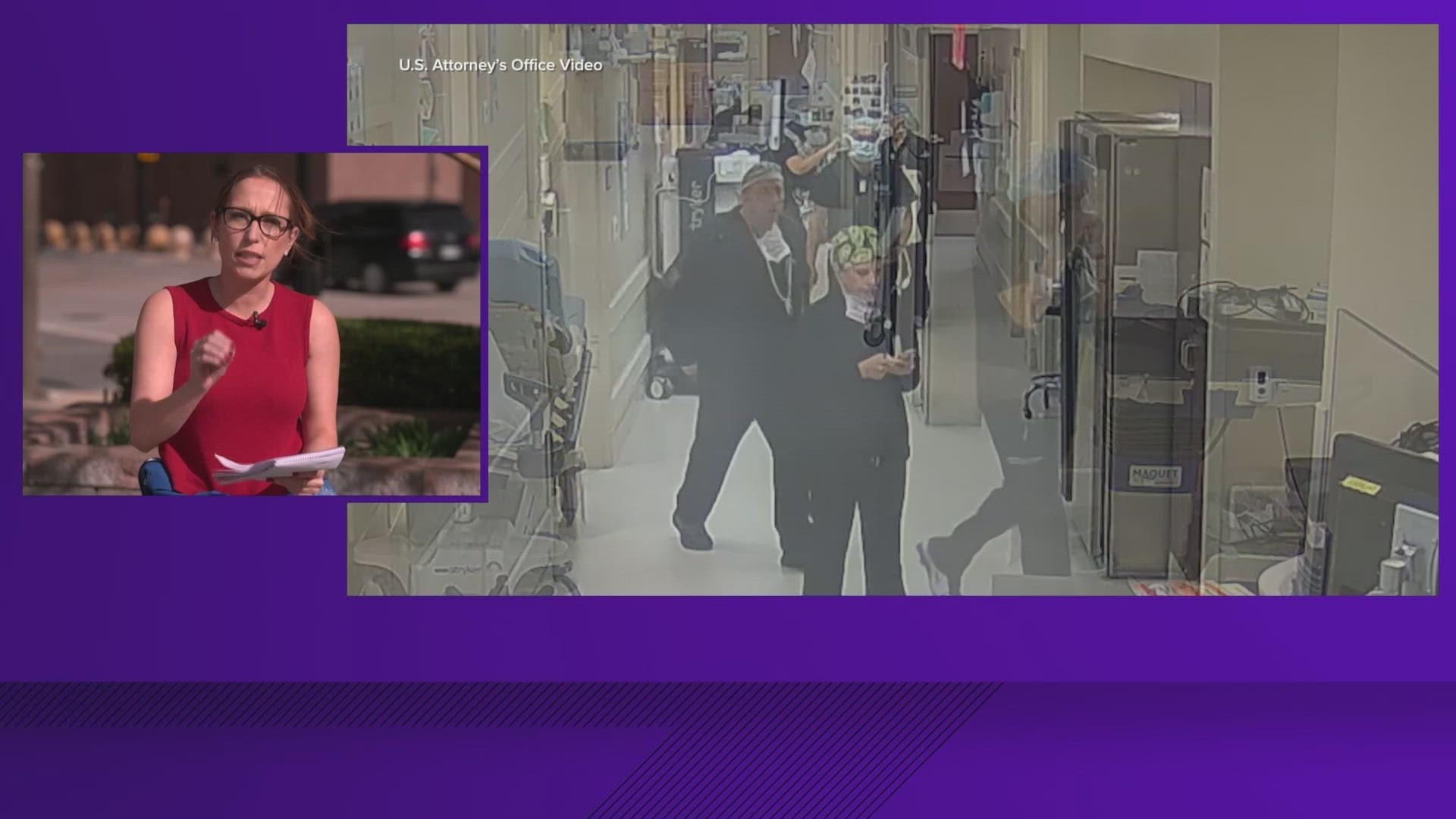DALLAS — Tuesday in federal court the trial continued for Dr. Raynaldo Ortiz, the Dallas anesthesiologist accused of poisoning IV bags with dangerous drugs in 2022 when he worked at Baylor Scott & White Surgicare North Dallas.
Prosecutors say a fellow anesthesiologist died after taking home one of the tainted bags, and 11 others, patients at the facility, suffered severe cardiac events after receiving fluids from other bags. Ortiz denied those allegations and has pleaded not guilty.
Before jurors entered the courtroom, federal prosecutors and Ortiz's defense attorneys argued before the judge about whether jurors could learn details about disciplinary investigations into Ortiz that happened prior to the alleged IV bag poisonings. Judge David Godbey ultimately ruled jurors could be told that there were investigations, but could not learn the details, the substance, of those alleged medical errors.
The first witness prosecutors called to the stand was Dr. William Carpenter, the plastic surgeon for an alleged IV bag poisoning victim. He recalled how his patient's blood pressure skyrocketed mid-surgery, rising to 180 systolic.
During Dr. Carpenter's cross-examination, defense attorneys tried to challenge whether the IV bag in question was really given to the patient just before her blood pressure spike, going back and forth on markings on her patient chart. While Ortiz's lawyers pointed to the fact that the patient had hypertension as a pre-existing condition to the surgery, Carpenter said that did not cause the spike. He called her cardiac episode a "complete surprise" and "out of the blue."
The second witness called to the stand was the executive director of the Texas Medical Board, Christopher Palazola. He testified to two separate disciplinary investigations Ortiz had been the subject of, one that concluded in 2018 and the other in 2022. He testified that less than 1% of Texas doctors have had two disciplinary orders against them.
Perhaps the most compelling testimony of the day came from one of Ortiz's alleged victims, a 57-year-old mother of three who had surgery on August 4 for back liposuction and a lower facelift. WFAA is not naming her as her identity is protected in court documents.
The woman testified that she woke up from her surgery in another facility's ICU, unable to open her eyes, intubated, and under the impression she was about to choke to death. She said her facelift wasn't complete because she had a medical cardiac emergency mid-surgery, and she woke up with, and for two years lived with, what looked like a "third ear" as a result. She also testified that she now has heart issues she did not have prior to that procedure and will have to be on beta blockers for her whole life.
She told the court she settled with Baylor Scott & White after her doctor approached her about a settlement and never hired an attorney. She said the hospital system also paid for her corrective surgery.
The fourth witness, Ashley Burks, was the administrator at Baylor Scott and White Surgicare North Dallas at the time of the alleged poisonings. Prosecutors spent the most time with her, having her walk jurors through a tremendous amount of surveillance video that showed Ortiz either checking on the IV bag warmer (where the alleged poisoned bags were put, according to prosecutors), putting bags in the warmer, or taking them out.
Included in that was a video from August 4th, the day of the woman's surgery who testified. Videos showed Ortiz taking drugs out of the medicine cabinet, taking a bag out of the warmer, and then coming back and putting a bag in the warmer. A few minutes later Ortiz was seen checking on the warmer twice, and after a nurse pulled a bag out of the warmer and took it into that woman's operating room, video showed staff and EMS rushing in and that woman being wheeled out to be transported to an ICU. Ortiz is observed watching that unfold.
But defense attorneys tried to poke holes in that video, showing jurors videos of incidents they say the government "left out." They showed video from the morning of the surgery that day and others, where nurses and other doctors are seen observing the IV warmer or taking bags out.
Burks testified that on August 24th, after staff was astounded and confused by now several patients having surprising and seemingly unexplainable emergency cardiac episodes, an 18-year-old man's surgery also went south. He, too, suffered a similar episode. Burks got emotional as she described what happened and said a doctor named Chad Marsden switched out Jack's IV bag with a "clean" one, then asked her to hold onto the one that Jack had been given during his blood pressure spike. She testified they noticed there was a small hole in an IV bag wrapper.
Prosecutors brought that bag to court and showed jurors the hole. During her cross-examination, defense attorneys focused on the fact that there's no way to "track" IV bags, meaning there's no way to know what specific bag goes into a warmer, where many are kept, or which ones come out.
Jurors will be back in court at 9 a.m. Wednesday for day 3 of the trial.

